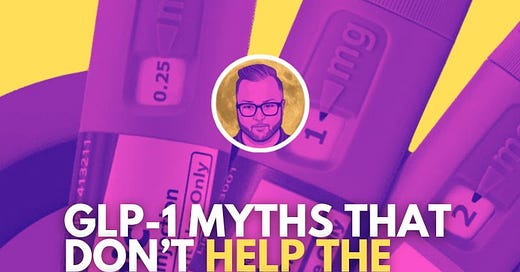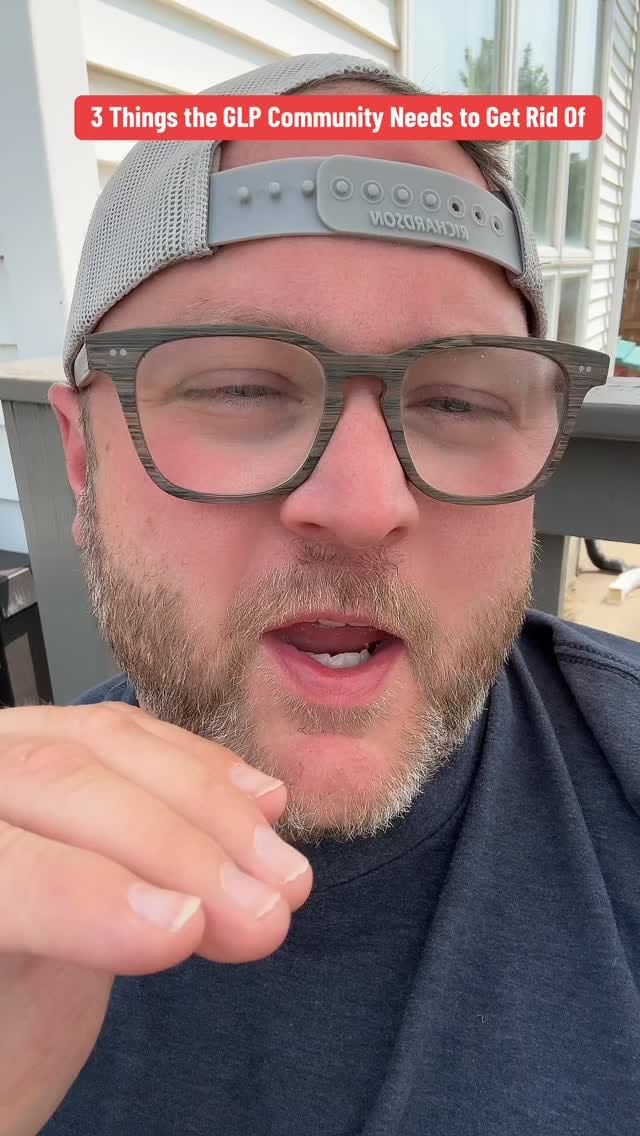Three Myths Holding Back the GLP-1 Community
As more patients turn to GLP-1 medications, it is time to clear the air on privacy, dosing, and false promises.
At On The Pen, our mission is to foster a patient-centered conversation about GLP-1 medications. We strive to bring clarity, compassion, and advocacy to a space that is too often clouded by misinformation and stigma. As the GLP-1 community grows, it is vital that we also hold ourselves accountable for the culture we are building.
In that spirit, here are three beliefs and behaviors the GLP-1 community would do well to leave behind.
First, we need to end the practice of speculating about who might be on a GLP-1 medication.
Whether it is a public figure or someone in your personal life, pointing to dramatic weight loss and assuming, or publicly suggesting, that they must be taking a GLP-1 crosses a line. Obesity is a disease. The decision to treat it, and how to treat it, is a personal matter and should remain private unless a person chooses to share.
We do not publicly speculate about how someone manages their blood pressure or their cancer treatment. The same respect should apply here. Outing someone’s treatment undermines both medical privacy and dignity.
Watch the video and follow along on Instagram! ⬇️
Second, we need to reject the idea that “less medication” is morally superior.
There is a growing tendency within the community to celebrate those who lose weight on the lowest possible dose of medication, or to imply that needing a higher dose is a sign of weakness or failure. This framing is not supported by science.
Obesity is a highly heterogeneous disease with multiple contributing factors, including genetics, hormonal regulation, gut-brain signaling, and environmental influences. There is ample evidence that individual responses to GLP-1 therapy vary considerably. Some patients experience robust effects on low doses. Others require higher doses to achieve similar outcomes. And some will require adjunctive therapies beyond GLP-1s to fully manage their disease.
There is no “prize” for losing weight on a lower dose. The goal is effective disease management, tailored to each individual’s needs. Medical care should never be a contest.
Third, we need to move past the notion that there is a universal hack for making GLP-1s work better.
Obesity is a complex, chronic disease. While lifestyle interventions remain important, there is no supplement, dietary trick, or “cheat code” that will universally enhance the efficacy of GLP-1 therapies. Claims to the contrary are often anecdotal at best, and at worst, exploitative.
Current clinical data tell us that patient response to GLP-1s depends on a wide range of biological and behavioral factors. Finding what works for you is valuable, and sharing experiences can be helpful. But implying that your approach will automatically work for everyone risks spreading misinformation and setting unrealistic expectations.
As a community, we should remain grounded in what the evidence tells us: obesity is a serious disease that requires personalized treatment. GLP-1 medications have opened new doors, but the path forward must be built on respect, empathy, and science.
What did I miss? Let me know in the comments below!







Absolutely agree with all three. I have been hesitant to share much about my journey, experience, and weight loss because the lower doses seem to work for me and I have had significant success. I do not want my success to make anyone else feel less than or cause them to feel badly or that they are doing something wrong, or that I’m doing something better or great. So I keep it to myself.
Admittedly, I know my weight loss is going to slow down as I get closer to my goal. I also don’t share because there are people who will take great pleasure and saying “Aha told you” because people gonna people.
That said, I also ascribe to the belief that my health information is my own. I haven’t shared even the mere fact that I take a GLP-1 with anyone other than with one friend who is also on a GLP-1 herself.
This isn’t a race, competition, or “gotcha game”. This is life and health.
PS - keeping good thoughts for your health and hope you are feeling better and receiving good care and support. 🫶🏻
Dave, really appreciate you bringing up these important points. You're spot on about respecting medical privacy—the speculation around people's health journeys is just not okay.
And yes, the individualized dosing piece is so crucial. Every person's body responds differently, and there should never be any judgment around what dose someone needs to see results.
I'm also really interested in the conversation around optimizing GLP-1 effectiveness. You're right to be cautious about oversimplified approaches—there's definitely a lot of questionable advice floating around out there.
From what I've seen in my own work, when patients combine these medications with thoughtful, personalized lifestyle and nutrition support, they often get even better outcomes. Obviously not talking about cookie-cutter solutions here—what helps one person might not work for another—but I think there's real value in exploring evidence-based integrative approaches alongside the medication.
As someone who struggled with obesity and metabolic issues for over a decade myself, I know firsthand how challenging and isolating this journey can be. That experience has shaped how I approach supporting others—there's no quick fixes, and everyone's path looks different.
I really pride myself on trying to support people as much as I can in this space, and I'm always open to feedback on how I communicate these ideas. If you ever have thoughts about the messages I'm putting out there, I'd genuinely welcome hearing them.
Thanks for continuing to elevate the discussion around GLP-1s. Your patient-centered approach to these conversations is really refreshing.